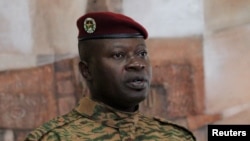The streets of Ouagadougou were quiet after a two-day standoff between junta chief Lieutenant-Colonel Paul-Henri Sandaogo Damiba and a newly-emerged rival for power, 34-year-old Captain Ibrahim Traore.
After a tumultuous weekend that also saw violent protests at the French embassy and culture center, Damiba agreed on Sunday to step down.
Diplomats said Damiba had gone to the Togolese capital Lome, and this was confirmed on Monday by the Togolese government, which said it had accepted him in order to support "peace in the sub-region."
Damiba "himself offered his resignation in order to avoid confrontations with serious human and material consequences," the religious and community leaders said in a statement.
It followed mediation between the junta chief and the new self-proclaimed leader, Ibrahim Traore, by the religious and community leaders, they added.
They also said that Damiba had set "seven conditions" for stepping down.
These included a guarantee of security for his allies in the military, "a guarantee of his security and rights" and that those taking power must respect the pledge he had given to West Africa's regional bloc for a return to civilian rule within two years.
The religious and community leaders — who are very influential in Burkina Faso — said that Traore accepted the conditions and "invites the population to exercise calm, restraint and prayer."
Traore told VOA in an interview Saturday he is not looking for a confrontation with Burkinabe forces that might be supporting the ousted junta.
“The fight we are engaged in is not about power,” he said. “The fight we are leading is for Burkina Faso."
“We are waiting for a national forum that will choose a president. We are not here for power,” Traore added.
The latest unrest began on Friday, when junior military officers announced they had toppled the country's junta leader, sparking deep concern among world powers over the latest putsch to hit the Sahel region battling a growing Islamist insurgency.
Security forces fired tear gas to disperse angry protesters outside the French embassy in Burkina Faso's capital earlier on Sunday, as unrest simmered.
Security forces fired tear gas from inside the compound to disperse the protesters after they set fire to barriers outside and lobbed rocks at the structure, with some trying to scale the fence, according to an AFP reporter on the scene.
In a statement read out on television on Sunday, the officers who claimed the coup said they had lifted a curfew they had imposed and called for a meeting of ministry heads for later in the day.
The officers had accused Damiba of having hidden at a military base of former colonial power France to plot a "counteroffensive," charges that he and France denied.
The French foreign ministry condemned "the violence against our embassy in the strongest terms" by "hostile demonstrators manipulated by a disinformation campaign against us."
It marked the latest incident against a France-linked building in two days, after a fire at the embassy on Saturday and a blaze in front of the French Institute in the western city of Bobo-Dioulasso. A French institute in the capital also sustained major damage, the foreign ministry said.
Traore called for an end to the attacks on Sunday.
The officers said they had carried out their putsch because Damiba had failed to quell jihadist attacks in the country.
The coup sparked a wave of international criticism, including from the United States, the African Union, the European Union and the regional grouping ECOWAS.
Damiba himself came to power in a coup in January. He installed himself as leader of the country's 16 million people after accusing elected president Roch Marc Christian Kabore of failing to beat back jihadist fighters. But the insurgency has raged on.
More than 40% of Burkina Faso remains outside government control.
Thousands have died and about two million have been displaced by the fighting since 2015, when the insurgency spread to Burkina Faso from Mali.
